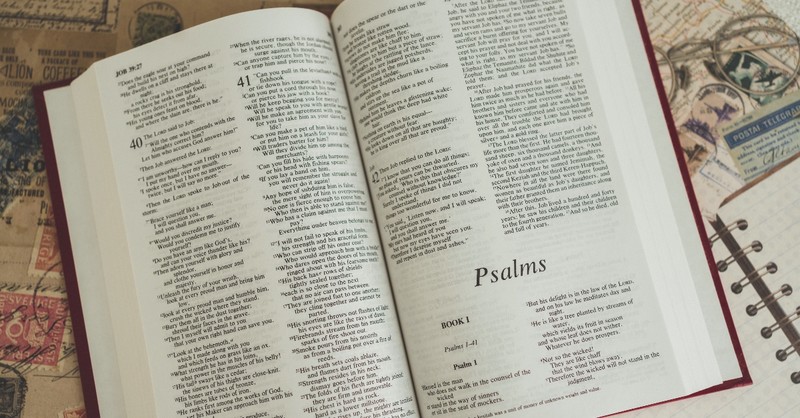
Songs of praise are written to glorify God, giving them a universality that allows them to be shared between believers across time, across languages, and across cultures. The Psalms have been translated and adapted over the centuries to be sung in synagogues and churches. Each one can hold fresh new meaning for people, but sometimes understanding what it meant in its day to the original writer can bring insight and a deeper understanding to one's walk with God, or what the Holy Spirit wants people to learn from it.
All of the Psalms were written by Hebrews living in the nation of Israel, and when interpreting one of these poems, it is crucial to remember that. Psalm 33:12 says, “Blessed is the nation whose God is the Lord, the people whom he has chosen as his heritage!”
This declaration was an assurance to the nation of Israel they are blessed, and a reminder they are called to be His. Today, believers can take comfort in knowing that everyone is called to follow the Lord, and that through the blessing from Israel of the Messiah, they too can be adopted into this family.
Nations should also take seriously the blessings that come from following the Lord, though ultimately Jesus will sit on the throne and rule and reign from Jerusalem in Israel. Everyone who is faithful and follows after God is blessed, but the Jewish people are still His chosen nation.
Photo credit: ©Getty Images/artisteer

What Is the Context of Psalm 33:12?
Psalm 33 is a call to worship, encouraging many to lift their voices in praise to God. There is not a universal consensus about who wrote it; some attribute this psalm to David, some attribute it to a later court musician, and some argue there is no way to know who wrote it. Many of the Psalms of David are attributed to him, and this one was not. Regardless, this Psalm has played a role in worship services through history. Even today it is read during Shabbat, the holiday of Yom Tov, and during the holiday of Sukkot.
It opens with calls to shout to the Lord, which is followed by reasons to praise God. It mentions His uprightness and faithfulness, His justice and His love. He is worshipped as Creator, and as the one whose Word always stands firm. The Psalmist mentions God’s sovereignty and His blessings. God’s power is compared against the kings of the earth, who are found lacking compared to the Lord. It ends with, “Let your steadfast love, O Lord, be upon us, even as we hope in you” (Psalm 33:22). One of the key recurring ideas in it is the power of nations and kings compared to the power of Almighty God.
Verse twelve refers to the blessings that God shows to those who follow His Word and His Law, and especially the nation of Israel. At the time this Psalm was written, Israel was the only nation in the world that had a covenant with Him, and who - in theory, if not always in practice - were solely committed to worshipping Him. He blessed them with the Law, with promises, with knowledge of Him, and would ultimately bring salvation to all the world through them.
Photo credit: Unsplash/milk-tea

Who Are "the People He Chose for His Inheritance"?
Not long after the people scattered at the tower of Babel, God found a man living in modern-day Iran named Abram, and He covenanted with that man. Through him and his wife, God would make a special people who would be set apart. To those people, God promised to always be faithful. Over and over again God commits to these promises, and even adds to them over time. He gives Abraham’s people borders, assurance they will not be wiped off the earth, and states that the hope of mankind will come through this family.
Verses about Israel as the Chosen People
“And I will make of you a great nation, and I will bless you and make your name great, so that you will be a blessing, I will bless those who bless you, and him who dishonors you I will curse, and in you all the families of the earth shall be blessed” (Genesis 12:2-3).
“For you are a people holy to the Lord your God, and the Lord has chosen you to be a people for his treasured possession, out of all the peoples who are on the face of the earth” (Deuteronomy 14:2).
“And the Lord has declared today that you are a people for his treasured possession, as he has promised you, and that you are to keep all his commandments, and that he will set you in praise and in fame and in honor high above all nations that he has made, and that you shall be a people holy to the Lord your God, as he promised” (Deuteronomy 26:18-19).
“And you established for yourself your people Israel to be your people forever. And you, O Lord, became their God. And now, O Lord God, confirm forever the word that you have spoken concerning your servant and concerning his house, and do as you have spoken” (2 Samuel 7:24-25).
“He will raise a signal for the nations and will assemble the banished of Israel, and gather the dispersed of Judah from the four corners of the earth” (Isaiah 11:12).
Photo credit: ©Getty Images/Hydromet

What This Verse Does and Does Not Mean
Some of the blessings and promises God made to the Jewish people through history became accessible to gentiles upon salvation. “Now the promises were made to Abraham and to his offspring. It does not say, ‘And to offsprings,’ referring to many, but referring to one, ‘And to your offspring,’ who is Christ….For as many of you as were baptized into Christ have put on Christ. There is neither Jew nor Greek, there is neither slave nor free, there is no male and female, for you are all one in Christ Jesus. And if you are Christ's, then you are Abraham's offspring, heirs according to promise” (Galatians 3:16 & 27-29). The promises of salvation, of a relationship with God, and of everything that comes with that is given to all people through Christ.
God made promises and covenants with people other than Abraham. He promised military victories, material blessings, and a throne which would have no ending from which a great king would sit. What does not transfer and is not applicable to the modern church are the promises and guarantees that were made to the nation-state of Israel as a political entity. When someone gets saved, they become a part of the family of God, but their country does not receive the same rights and responsibilities as the nation-state of Israel. Promises such as guarantees of military victories or expanded borders to not apply to gentile nations, even if they follow the living God.
The Lord promised never to forget, or fully set aside, Israel. “Remember these things, O Jacob, and Israel, for you are my servant; I formed you; you are my servant; O Israel, you will not be forgotten by me” (Isaiah 44:21). In His time, He will not only restore the nation of Israel, but He will expand its borders from the Nile to the Euphrates, protect it during the Tribulation, and ultimately rule and reign from its capital for a thousand years.
It can be tempting to read a variety of passages in the Bible as allegorical, meaning they are symbolic. Then it becomes easy to point to a variety of passages traditionally believed to refer to the nation of Israel, and re-interpret it as referring to the modern church. While there are passages, such as Jesus’ parables, that should be taken as symbolic, it is dangerous to interpret selective passages referring to the Jews to mean the church. It ignores Paul’s warning, “...do not be arrogant toward the branches. If you are, remember it is not you who support the root, but the root that supports you… For if you were cut from what is by nature a wild olive tree, and grafted, contrary to nature, into a cultivated olive tree, how much more will these, the natural branches, be grafted back into their own olive tree” (Romans 11:18-24).
The full passage compares humanity to an olive tree. The Jewish people rejected the Messiah in His day, being like the branches that were cut off, giving the Gentiles the opportunity to be grafted onto the tree. However, God can and will graft the original branches - being the Jewish people - back onto the tree in order that all the promises to Abraham, Isaac, Jacob, and David will be fulfilled through Jesus Christ.
Photo credit: ©Getty Images/Hleb Usovich

Will the Nation Whose God Is the Lord Be Blessed Today?
God does bless those who love Him and follow His ways, and there is no doubt that countries where the majority of people are sincere believers receive blessings from the Lord. However, one thing that has proven true through Biblical and historical evidence is that sometimes evil nations prosper for a period of time. Just because this nation is full of Christians and that nation is full of atheists or people practicing paganism, it does not mean the Christian nation will be wealthy, prosperous, and safe while the nations that reject God wallow in poverty and conflict. Many evil people and evil nations have wielded great power and authority at different times in history.
An important contextual fact that can help clarify what the Bible means when it refers to a nation is that for much of human history, nations, nationalities, and people groups were often words used to mean the same thing. Today it is common for a nation to be marked by a border, and within those borders are a variety of languages and ethnicities. During the majority of time the Old and New Testaments were being written, and even codified, a nation could refer just as easily to a large group of people who shared a language, an ethnic identity, and allegiance to one another. When the Bible says a nation shall be blessed if their God is the Lord, it does not inherently mean a country. It could mean a people group.
Christians should strive to evangelize, pray for the leaders of their nation, and strive to see their whole country repent of their sins and turn to God for salvation and eternal life, and God may bless a nation where such a revival takes place. God’s Word is clear, and history bears out that all nations rise and fall. Until Jesus sits on the throne again, evil people and nations will have victories, and the righteous will suffer. While any nation that follows God can receive His blessings, the promise and guarantee was made primarily to the nation of Israel.
Photo credit: ©Getty Images/Tinnakorn Jorruang

What Does It Look Like for a Nation to Follow God?
Gentile nations can still follow the living God, and God does bless those who follow Him. Sometimes those blessings are eternal, and people suffer in this life. Many ethnic groups that would have been identified as nations in ancient times follow God and are looking forward to eternal reward. Some nations follow God and receive blessings in this life.
Many believe the United States was blessed because the people in it were mostly Christians who tried their best to follow after God. A Christian nation is full of believers, many of whom are evangelizing the lost, caring for the poor, and becoming sanctified. It should be noted that across the world and through human history, there have been more nations in rebellion against God than ones that truly follow Him.
By sharing the love of Christ, believers today may be able to influence the politics of the country so the nation’s laws better reflect God’s will. As the End of Days approaches, it may be more difficult, but Christians should still strive to honor Christ with their vote, with their conduct, and to pray for revival.
Sources
Bullock, C. Hassell. Encountering the Book of Psalms. Grand Rapids: Baker Academic, 2001.
Lewis, C.S. Reflections on the Psalms. Harper Collins, 2017.
Parker, Brent and Richard Lucas. Covenantial and Dispensational Theologies Four Views on the Continuity of Scripture. InterVarsity Press, 2022.
Tsarfati, Amir. Israel and the Church. Eugene: Harvest House Publishers, 2021.
Photo credit: ©Getty Images/Khanchit Khirisutchalual
Originally published Wednesday, 17 January 2024.








